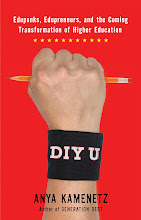
I have been following the news of financial crisis just like everyone else this past week, trying to keep up and make sense of it all.
Two basic points have emerged from talking with people who have a closeup view of the situation:
One is that money just can't stand still. What everyone's afraid of right now is a credit freeze where people are afraid to lend to each other. A money market fund, in fact, the company that INVENTED the money market fund--a low-yield investment vehicle based on very short-term securities, which was until now considered as safe as cash--"broke the buck" because of Lehman Bros.' bankruptcy, and it had to freeze withdrawals as well. Overall holdings of money market funds had risen more than 10 percent this year because nervous investors were taking their money "out of the market"--but now they find that the money funds aren't truly safe either.
It's enough to freak anyone out. If you hold your money in paper (cash), it loses value at the rate of inflation. If you deposit it in a bank, you still probably won't beat inflation, plus the bank could fail, but at least you're insured up to $100,000 by the FDIC. If you buy gold? Well, gold's gone up a hell of a lot this decade.
Other than chaotic bear markets like this one, the responsible thing to do has always been to put your money, any savings you don't need right away, to "work" for you in the market, which people now realize basically means lending it out at interest.
You have to risk something, but as the money market incident shows, we don't really always understand what the risk is. Neither did the experts.
Which leads to the other point: our entire system of money is based on social trust. Why is it that the federal government can come up with the cash to bail out the financial system? Well, the federal government can borrow money at extremely low rates--in fact, at one point last week people were practically PAYING the government to hold onto their money (Treasury bond yields went to near zero).
Why can the government borrow at such low rates? Because people around the world believe that the government will make good on its debts. How will it make good on its debts? American taxpayers will keep paying their taxes. How do we know people will keep paying their taxes? Because this country's been going along with the rule of law for about 300 years now, and at least within our borders, the law means something. Contracts mean something. Promises mean something. That's what it's all based on.
So, how much do you trust the people in charge right now?





